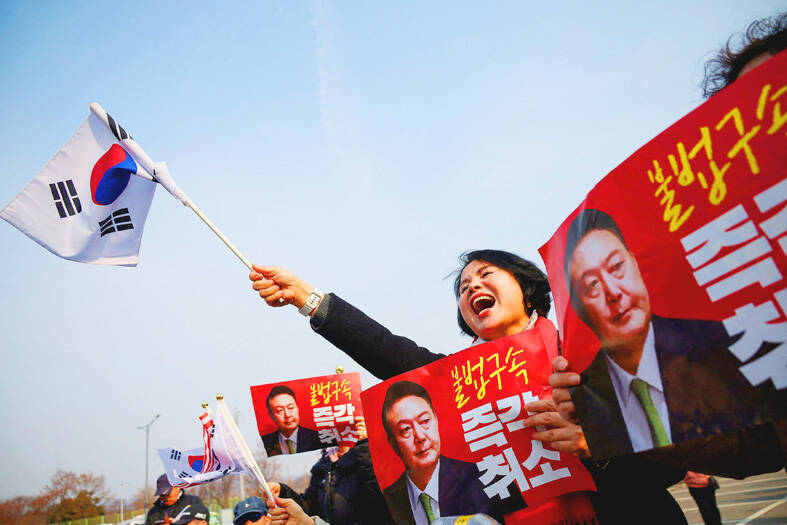A South Korean court yesterday ordered impeached President Yoon Suk-yeol to be released from jail, a move that could allow Yoon to stand trial for his rebellion charge without being physically detained.
Yoon was arrested and indicted in January over his martial law decree on Dec. 3 last year that plunged the country into political turmoil. The opposition-controlled parliament separately voted to impeach him, leading to his suspension from office.
The hearings in his impeachment trial at the Constitutional Court concluded late last month, which is expected to rule soon on whether to formally remove him from office or reinstate him.

Photo: REUTERS
The Seoul Central District Court said it accepted Yoon’s request to be released from jail because the legal period of his formal arrest expired before he was indicted.
The court also cited the need to resolve questions over the legality of the investigations on Yoon. Yoon’s lawyers have accused the investigative agency that detained him before his formal arrest of lacking legal authority to probe rebellion charges.
Investigators have alleged that the martial law decree amounted to rebellion. If he is convicted of that offense, he would face the death penalty or life imprisonment.
Yoon’s defense team welcomed the court’s decision and urged prosecutors to release him immediately.
The presidential office also welcomed the court’s decision, saying it hopes Yoon would swiftly return to work.
However, South Korean law allows prosecutors to continue to hold a suspect whose arrest has been suspended by a court temporarily while pursuing an appeal.
The main liberal opposition Democratic Party called on prosecutors to immediately appeal the court’s ruling.
If the Constitutional Court upholds Yoon’s impeachment, he would be officially thrown out of office and a national election would be held to choose his successor within two months.
If the court rejects his impeachment, but he is still in jail, it is unclear whether and how soon he would be able to exercise his presidential powers.
Massive rallies by opponents and supporters of Yoon have filled the streets of Seoul and other major South Korean cities. Whatever the Constitutional Court decides, experts say it would likely further polarize the country and intensify its conservative-liberal divide.

BUILDUP: US General Dan Caine said Chinese military maneuvers are not routine exercises, but instead are ‘rehearsals for a forced unification’ with Taiwan China poses an increasingly aggressive threat to the US and deterring Beijing is the Pentagon’s top regional priority amid its rapid military buildup and invasion drills near Taiwan, US Secretary of Defense Pete Hegseth said on Tuesday. “Our pacing threat is communist China,” Hegseth told the US House of Representatives Appropriations Subcommittee on Defense during an oversight hearing with US General Dan Caine, chairman of the Joint Chiefs of Staff. “Beijing is preparing for war in the Indo-Pacific as part of its broader strategy to dominate that region and then the world,” Hegseth said, adding that if it succeeds, it could derail

CHIP WAR: The new restrictions are expected to cut off China’s access to Taiwan’s technologies, materials and equipment essential to building AI semiconductors Taiwan has blacklisted Huawei Technologies Co (華為) and Semiconductor Manufacturing International Corp (SMIC, 中芯), dealing another major blow to the two companies spearheading China’s efforts to develop cutting-edge artificial intelligence (AI) chip technologies. The Ministry of Economic Affairs’ International Trade Administration has included Huawei, SMIC and several of their subsidiaries in an update of its so-called strategic high-tech commodities entity list, the latest version on its Web site showed on Saturday. It did not publicly announce the change. Other entities on the list include organizations such as the Taliban and al-Qaeda, as well as companies in China, Iran and elsewhere. Local companies need

CROSS-STRAIT: The MAC said it barred the Chinese officials from attending an event, because they failed to provide guarantees that Taiwan would be treated with respect The Mainland Affairs Council (MAC) on Friday night defended its decision to bar Chinese officials and tourism representatives from attending a tourism event in Taipei next month, citing the unsafe conditions for Taiwanese in China. The Taipei International Summer Travel Expo, organized by the Taiwan Tourism Exchange Association, is to run from July 18 to 21. China’s Taiwan Affairs Office spokeswoman Zhu Fenglian (朱鳳蓮) on Friday said that representatives from China’s travel industry were excluded from the expo. The Democratic Progressive Party government is obstructing cross-strait tourism exchange in a vain attempt to ignore the mainstream support for peaceful development

ELITE UNIT: President William Lai yesterday praised the National Police Agency’s Special Operations Group after watching it go through assault training and hostage rescue drills The US Navy regularly conducts global war games to develop deterrence strategies against a potential Chinese invasion of Taiwan, aimed at making the nation “a very difficult target to take,” US Acting Chief of Naval Operations James Kilby said on Wednesday. Testifying before the US House of Representatives Armed Services Committee, Kilby said the navy has studied the issue extensively, including routine simulations at the Naval War College. The navy is focused on five key areas: long-range strike capabilities; countering China’s command, control, communications, computers, cyber, intelligence, surveillance, reconnaissance and targeting; terminal ship defense; contested logistics; and nontraditional maritime denial tactics, Kilby